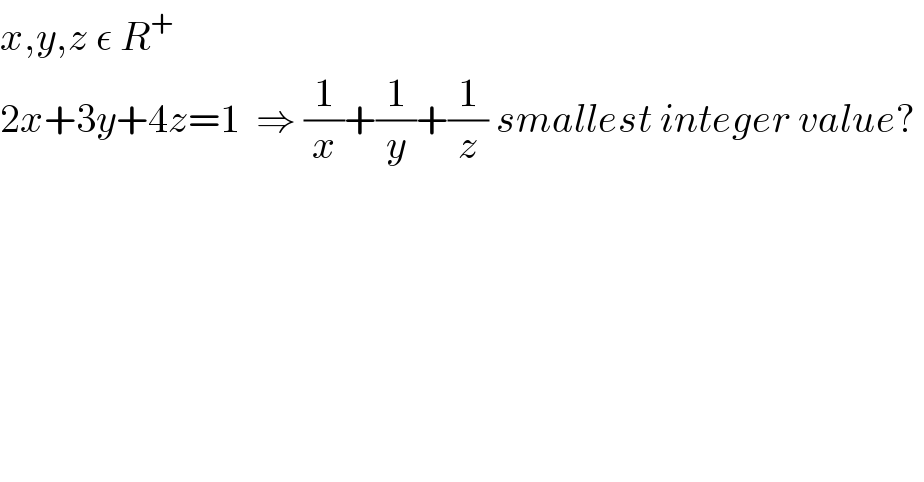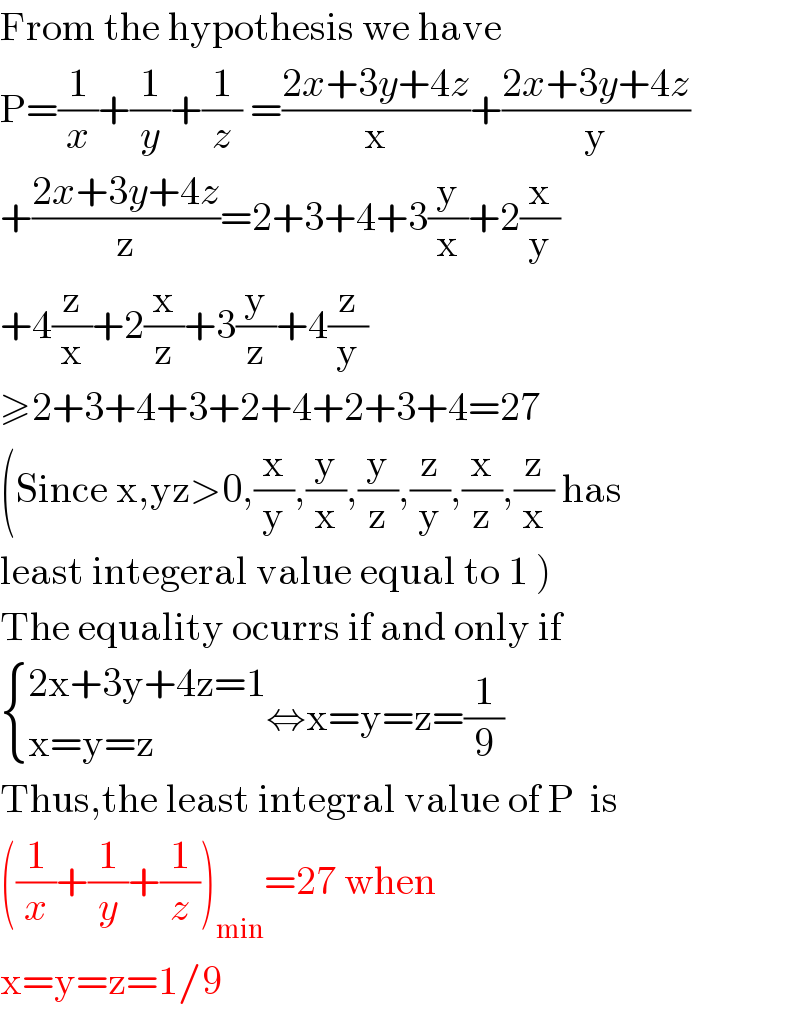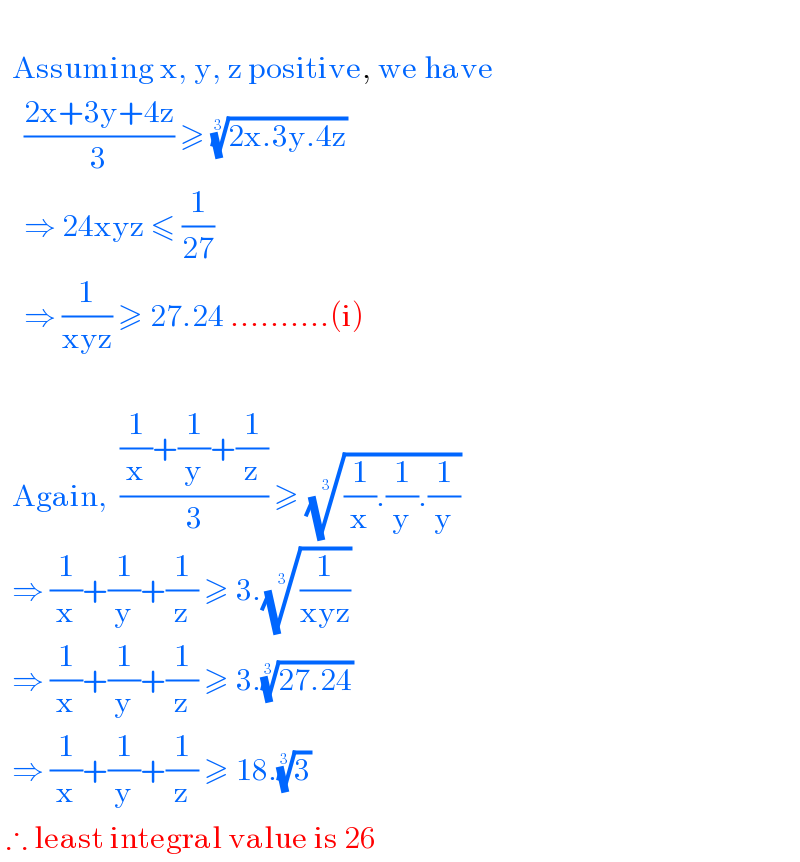
Question Number 115951 by Fikret last updated on 29/Sep/20

$${x},{y},{z}\:\epsilon\:{R}^{+} \:\: \\ $$$$\mathrm{2}{x}+\mathrm{3}{y}+\mathrm{4}{z}=\mathrm{1}\:\:\Rightarrow\:\frac{\mathrm{1}}{{x}}+\frac{\mathrm{1}}{{y}}+\frac{\mathrm{1}}{{z}}\:{smallest}\:{integer}\:{value}?\: \\ $$
Answered by 1549442205PVT last updated on 30/Sep/20

$$\mathrm{From}\:\mathrm{the}\:\mathrm{hypothesis}\:\mathrm{we}\:\mathrm{have}\: \\ $$$$\mathrm{P}=\frac{\mathrm{1}}{{x}}+\frac{\mathrm{1}}{{y}}+\frac{\mathrm{1}}{{z}}\:=\frac{\mathrm{2}{x}+\mathrm{3}{y}+\mathrm{4}{z}}{\mathrm{x}}+\frac{\mathrm{2}{x}+\mathrm{3}{y}+\mathrm{4}{z}}{\mathrm{y}} \\ $$$$+\frac{\mathrm{2}{x}+\mathrm{3}{y}+\mathrm{4}{z}}{\mathrm{z}}=\mathrm{2}+\mathrm{3}+\mathrm{4}+\mathrm{3}\frac{\mathrm{y}}{\mathrm{x}}+\mathrm{2}\frac{\mathrm{x}}{\mathrm{y}} \\ $$$$+\mathrm{4}\frac{\mathrm{z}}{\mathrm{x}}+\mathrm{2}\frac{\mathrm{x}}{\mathrm{z}}+\mathrm{3}\frac{\mathrm{y}}{\mathrm{z}}+\mathrm{4}\frac{\mathrm{z}}{\mathrm{y}} \\ $$$$\geqslant\mathrm{2}+\mathrm{3}+\mathrm{4}+\mathrm{3}+\mathrm{2}+\mathrm{4}+\mathrm{2}+\mathrm{3}+\mathrm{4}=\mathrm{27} \\ $$$$\left(\mathrm{Since}\:\mathrm{x},\mathrm{yz}>\mathrm{0},\frac{\mathrm{x}}{\mathrm{y}},\frac{\mathrm{y}}{\mathrm{x}},\frac{\mathrm{y}}{\mathrm{z}},\frac{\mathrm{z}}{\mathrm{y}},\frac{\mathrm{x}}{\mathrm{z}},\frac{\mathrm{z}}{\mathrm{x}}\:\mathrm{has}\right. \\ $$$$\left.\mathrm{least}\:\mathrm{integeral}\:\mathrm{value}\:\mathrm{equal}\:\mathrm{to}\:\mathrm{1}\:\right) \\ $$$$\mathrm{The}\:\mathrm{equality}\:\mathrm{ocurrs}\:\mathrm{if}\:\mathrm{and}\:\mathrm{only}\:\mathrm{if} \\ $$$$\begin{cases}{\mathrm{2x}+\mathrm{3y}+\mathrm{4z}=\mathrm{1}}\\{\mathrm{x}=\mathrm{y}=\mathrm{z}}\end{cases}\Leftrightarrow\mathrm{x}=\mathrm{y}=\mathrm{z}=\frac{\mathrm{1}}{\mathrm{9}} \\ $$$$\mathrm{Thus},\mathrm{the}\:\mathrm{least}\:\mathrm{integral}\:\mathrm{value}\:\mathrm{of}\:\mathrm{P}\:\:\mathrm{is} \\ $$$$\left(\frac{\mathrm{1}}{{x}}+\frac{\mathrm{1}}{{y}}+\frac{\mathrm{1}}{{z}}\right)_{\mathrm{min}} =\mathrm{27}\:\mathrm{when} \\ $$$$\mathrm{x}=\mathrm{y}=\mathrm{z}=\mathrm{1}/\mathrm{9} \\ $$
Commented by soumyasaha last updated on 01/Oct/20

$$\: \\ $$$$\:\:\mathrm{Assuming}\:\mathrm{x},\:\mathrm{y},\:\mathrm{z}\:\mathrm{positive},\:\mathrm{we}\:\mathrm{have} \\ $$$$\:\:\:\:\frac{\mathrm{2x}+\mathrm{3y}+\mathrm{4z}}{\mathrm{3}}\:\geqslant\:\sqrt[{\mathrm{3}}]{\mathrm{2x}.\mathrm{3y}.\mathrm{4z}} \\ $$$$\:\:\:\:\Rightarrow\:\mathrm{24xyz}\:\leqslant\:\frac{\mathrm{1}}{\mathrm{27}} \\ $$$$\:\:\:\:\Rightarrow\:\frac{\mathrm{1}}{\mathrm{xyz}}\:\geqslant\:\mathrm{27}.\mathrm{24}\:..........\left(\mathrm{i}\right) \\ $$$$ \\ $$$$\:\:\mathrm{Again},\:\:\frac{\frac{\mathrm{1}}{\mathrm{x}}+\frac{\mathrm{1}}{\mathrm{y}}+\frac{\mathrm{1}}{\mathrm{z}}}{\mathrm{3}}\:\geqslant\:\sqrt[{\mathrm{3}}]{\frac{\mathrm{1}}{\mathrm{x}}.\frac{\mathrm{1}}{\mathrm{y}}.\frac{\mathrm{1}}{\mathrm{y}}} \\ $$$$\:\:\Rightarrow\:\frac{\mathrm{1}}{\mathrm{x}}+\frac{\mathrm{1}}{\mathrm{y}}+\frac{\mathrm{1}}{\mathrm{z}}\:\geqslant\:\mathrm{3}.\sqrt[{\mathrm{3}}]{\frac{\mathrm{1}}{\mathrm{xyz}}} \\ $$$$\:\:\Rightarrow\:\frac{\mathrm{1}}{\mathrm{x}}+\frac{\mathrm{1}}{\mathrm{y}}+\frac{\mathrm{1}}{\mathrm{z}}\:\geqslant\:\mathrm{3}.\sqrt[{\mathrm{3}}]{\mathrm{27}.\mathrm{24}} \\ $$$$\:\:\Rightarrow\:\frac{\mathrm{1}}{\mathrm{x}}+\frac{\mathrm{1}}{\mathrm{y}}+\frac{\mathrm{1}}{\mathrm{z}}\:\geqslant\:\mathrm{18}.\sqrt[{\mathrm{3}}]{\mathrm{3}} \\ $$$$\:\therefore\:\mathrm{least}\:\mathrm{integral}\:\mathrm{value}\:\mathrm{is}\:\mathrm{26} \\ $$
